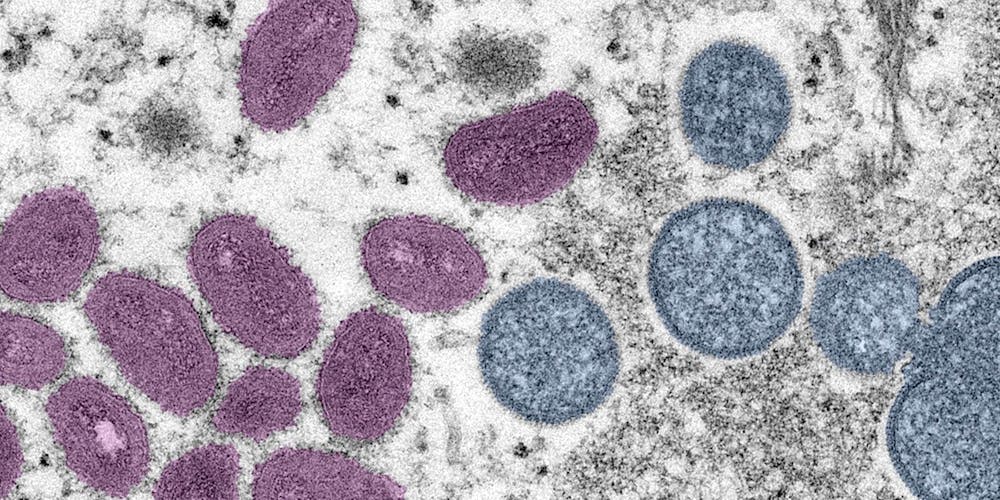Navigating a public health crisis has become part of the norm for student life during the COVID-19 pandemic. Now, as monkeypox casts a familiar air of uncertainty, UF students worry they could face another viral outbreak.
The Centers for Disease Control and Prevention declared monkeypox a public health emergency in July, with the Florida Department of Health reporting the first confirmed monkeypox case in Alachua County soon after.
As of Sept. 10, there are nine monkeypox cases reported in Alachua County, with one of the cases belonging to the 15 to 19 years age range, and another in the 20 to 24 years age range. The number of reported cases increased by five since Aug. 29.
Alachua County has shared information about monkeypox from the Florida Health Department; however, response procedure isn’t at the county level because the area isn’t under a state of emergency, Alachua County spokesperson Mark Sexton said.
The past two years of the COVID-19 pandemic included quarantine periods, mask mandates and safety protocols. Many feel burnt out from dealing with the outcome of a pandemic and are wary of monkeypox.
Monkeypox is transmitted predominantly from intimate skin-to-skin contact with an infected person, but it can also be transmitted through close contact with respiratory droplets, said Jerne Shapiro, UF Department of Epidemiology faculty member.
The symptoms of monkeypox include the emergence of rashes, fever, exhaustion and muscle aches. The disease often lasts two to four weeks, according to the CDC.
Data from the CDC conveys that men who have sex with men make up the majority of monkeypox cases. Monkeypox vaccination and education efforts have been focused on that group, said Paul Myers, administrator of the Florida Department of Health in Alachua County.
However, LGBTQ+ advocates caution those who fear monkeypox to not repeat the mistake of the HIV/AIDS crisis. Anyone who has been in personal contact with an infected individual is at risk, according to the CDC.
While students have recently made their return to Gainesville, the risk of monkeypox is not directly tied to an increase in population, Shapiro said.
“It does bring people in that may have traveled, but the real risk for monkeypox comes with the number of sexual partners that you have had recently,” Shapiro said. “It's not transmitted through handshakes or casual contact. The majority of the population is not at risk.”
Alexandria Daves, a UF chemical engineering senior, said she fears contracting monkeypox and wears a mask to minimize her risk of catching any illnesses. The 21-year-old said she feels a little nervous about being on campus with the potential of monkeypox spread.
But the nerves don’t trump her desire to attend classes in-person.
“I go back and forth because when I hear about [monkeypox] on the news, I’m like ‘I need to make sure I’m washing my hands and keeping away from people,’” Daves said. “I started disinfecting my phone and my iPad and laptop when I get home.”
Jana Taher, a 20-year-old UF English senior, was concerned when she first heard about monkeypox over the summer. Taher worried the outbreak could impact her return to UF.
“I was freaking out a lot because I was scared,” Taher said. “But it seems like nobody cares.”
Most pretend COVID-19 and monkeypox don’t exist, even though they know the diseases are still present because dealing with public health crises has been tiring, Taher said.
“What exactly are we supposed to do as a bunch of young adults when the universities, the state governments or city governments aren't doing anything to actually combat it — what are we supposed to do?” Taher asked. “We just have to keep going and pretend that it's not there, even though it is, which is scary.”
With the start of a new school year and an increase in campus activity, UF released a statement Aug. 26 to update the university’s community on current public health concerns. UF’s statement mentioned there may be “probable [monkeypox] cases on campus.”
UF spokesperson Cynthia Roldan said UF’s monkeypox prevention policy is aligned with CDC guidance and recommends individuals avoid close, skin-to-skin contact with individuals who have a rash similar to monkeypox. People should also avoid sharing bedding, towels, clothing or kitchen utensils with those individuals.
Washing hands thoroughly and often is also recommended, Roldan said.
Individuals who are high risk or immunocompromised should contact their county health department for a monkeypox vaccine, UF’s statement suggests.
“The monkeypox vaccine remains in short supply at the Strategic National Stockpile,” Roldan said. “[The university] can conduct testing at our hospitals and student health care center. If a case is identified, the Florida Department of Health in Alachua County would be contacted.”
Myers noted Alachua County was well prepared for COVID-19. Now, it’s also equipped to handle monkeypox, he affirmed.
“In terms of monkeypox, once again, we are faced with a global disease that certainly is a threat to our community,” Myers said. “When it comes to mass vaccination clinics, we have to be very judicious with the vaccines that we have and we have done that in terms of prioritizing the populations that we’re vaccinating right now.”
It’s understandable why people aren’t especially stressed by monkeypox after dealing with the COVID-19 pandemic, said Jessica Nower, a 19-year-old aerospace engineering sophomore. However, she believes people should at least be informed about how monkeypox is transferred.
Nower isn’t as nervous about monkeypox compared to how she felt about COVID-19.
“At first, I was a lot more nervous when I was [first hearing] about it,” Nower said. “Once I did more research and heard from doctors about how it's actually spread, I felt less nervous about it.”
UF computer science freshman Nathan Bailey said he doesn’t feel particularly worried about monkeypox because he knows the disease’s main modes of transmission and to avoid people who are ill.
“Even if monkeypox doesn't turn out to be a pandemic — which personally I don't think it will — we should still be concerned about it as we should any other infectious disease,” the 18-year-old said.
Nicole Colon, a 22-year-old UF chemistry major, said she isn’t very aware of monkeypox and fears COVID-19 more. Colon feels comfortable on campus, but wears a mask to stay safe.
“I have family members that are immunocompromised, so I wanted to stay safe for them,” Colon said.
Contact Melanie at mpena@alligator.org or follow her on Twitter at @MelanieBombino_.

Melanie Peña is a second-year business and journalism major. When she's not designing a graphic or writing an article, she's probably making jewelry or exploring coffee shops in Gainesville.






